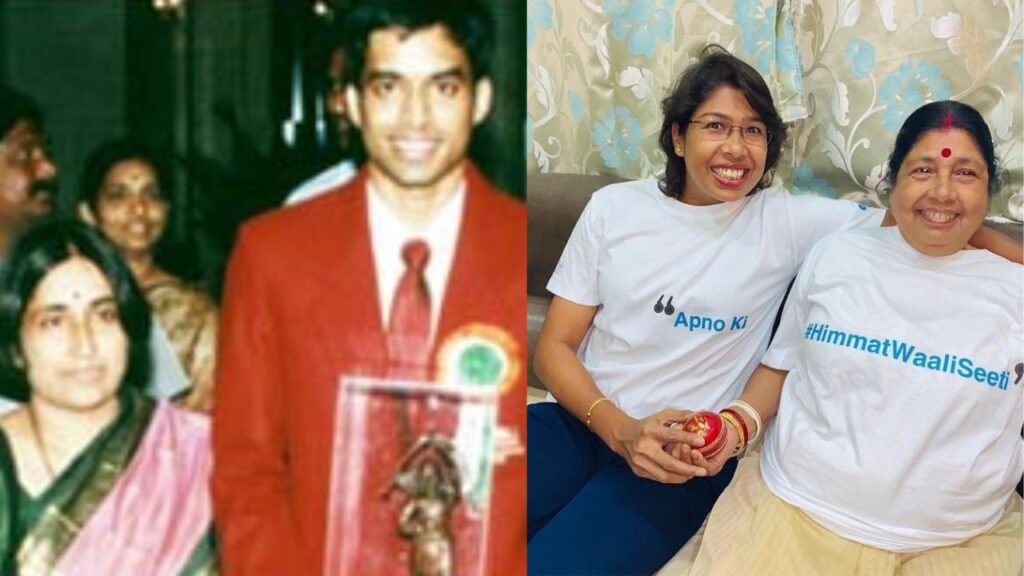
Successful sports stories don’t happen overnight. They need to be nurtured for years for the world to see them in full bloom. For an 87.58m javelin throw or a badminton academy that changes the course of the sport forever, years of effort are in the background. And in many of these cases, the mother, literally, is the unsung hero. On Mother’s Day, it is essential that we celebrate some of these women and their contribution to sport.
A trip to the Pullela Gopichand academy in Hyderabad, India’s medal-winning badminton factory, can never be complete without dining with the young students and enjoying the superb food on offer. Things have not been easy for Gopi or the academy. “I had to mortgage the house to be able to build the academy,” said Gopi. “At the time in 2004-5, my mother was diagnosed with cancer and it was tough. Had she not pushed me to do things, I don’t know if all of this could happen. And she fought her way through and today runs the academy with the same discipline that she had taught me as a child.”
Pressed to tell us more about the challenges, he looked at his mother who had already taken charge! Chicken curry, aloo-bhindi, roti, rice, curd and achar constituted our lunch. “This is what the players get and it is all made inside the academy,” said Gopi’s mother, who heads the administrative wing in the academy. “We have eighty men and women who now live in the academy. Almost all of them eat breakfast, lunch and dinner here itself. The food helps them a lot because it means staying off outside food and also spares them the time of having to think of what to eat.”
Devendra Jhajharia, India’s greatest Paralympian, lost an arm at the age of eight when he accidentally touched an electric cable while climbing a tree. “The shock was more mental than anything else,” said Devendra. “When I came back home from the hospital, I was depressed. For the first one month, I refused to leave my house.”
Here’s RevSportz Celebrating #MothersDay with star athletes and actresses and their mothers.
Saika Ishaque, Pritam Kotal Sohini Sarkar express their love and gratitude for their Mother.
Stay tuned for more #MothersDay2023 special episodes@AMRI_Hospitals @sharmisthagoop2 pic.twitter.com/DF4f8WqjGd
— RevSportz (@RevSportz) May 14, 2023
It was a sense of inferiority and peer pressure that had started to weigh on the mind of young Devendra. It was only when his mother motivated him to go out and play with the neighbourhood kids that he finally started stepping out to socialise. His mother was clear: Devendra was a victim of circumstances, and was in no way inferior to anyone else. She inspired him to do everything that he did earlier. He still remains indebted to her for the early confidence she was able to instil in a confused and scared eight-year-old child.
Similarly, Mariyappan Thangavelu, who won India’s first Paralympics gold in Rio 2016 in the high jump, lost a leg at the age of five. He was playing outside his house when a state-owned transport corporation bus hit him. Abandoned by his father before he entered his teenage years, he was brought up by his mother who used to sell vegetables on a cycle in Tamil Nadu’s Salem district. She struggled to make ends meet, but never gave up trying to support her son. Eventually he emerged a Paralympic champion. His mother continued to sell vegetables even after he was an Olympic champion – a real-life story that could perhaps happen only in India.
For Sudha Devi, mother of Sakshi Malik, 2016 Rio medallist, her daughter’s birth was the turning point. Sakshi was born in 1992, a few weeks after the Barcelona Olympics. ‘Lakshmi finally came to our poor home that day,’ said Sudha. While she was still in the maternity ward, she received the appointment letter for her first job as an Anganwadi worker. May be this is how she garnered the strength to let Sakshi pursue her dream of becoming a wrestler. Unafraid of societal pressure, Sudha would accompany her young twelve-year-old daughter early morning to the akhara for her to wrestling classes. She went to the Chotu Ram Stadium in Rohtak where she was taken under the wing of Ishwar Dahiya, the wrestling coach. Malik would rise before dawn to make her 5.30 am training session, while Sudha would make sure her daughter had a glass of fresh almond milk waiting for her at the end of practice.
And in all the sacrifice and effort, there are some incredible gems of laughter that define these relationships. Jhulan Goswami’s interaction with her mother at the end of a trip to the NCA was one such. Goswami, who was recuperating from injury at the time had been prescribed Bajra Roti by her nutritionist. Her mother, having heard the request, had a fantastic retort. Goswami had grown up to become who she was having eaten her mother’s food all her life. Brown rice was something that had been added to the repertoire at Jhulan’s insistence. Bajra Roti was not in the syllabus, and her mother refused to take this request seriously! Even without the Bajra Roti at home, Jhulan remains the legend that she is, and her mother remains the last word in her life!
Happy Mother’s Day to all.



